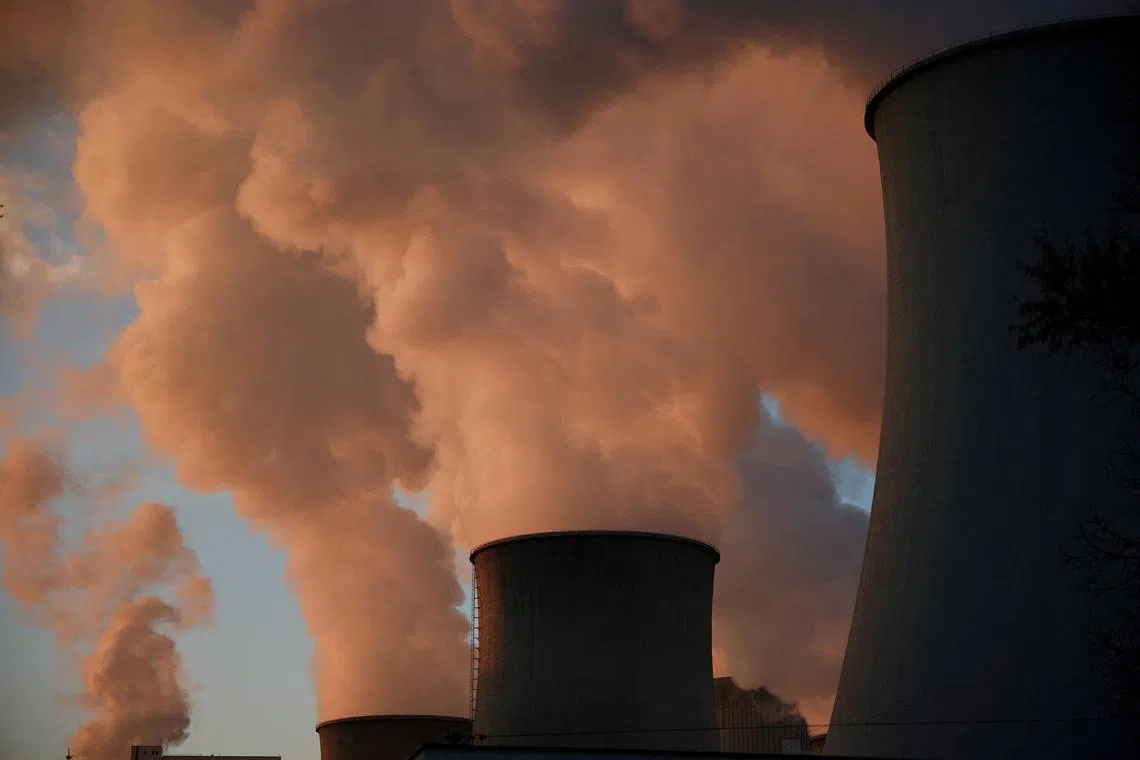EU unveils 2040 climate targets with deep emissions cut
Sign up now: Get ST's newsletters delivered to your inbox

The 27-nation European Union has pledged to be carbon neutral by 2050.
PHOTO: REUTERS
Follow topic:
BRUSSELS – The EU on Feb 6 unveils its climate targets for 2040 and a roadmap for the next stage of its energy transition, four months before European elections and with the bloc reeling from a farmer revolt against green reforms.
The 27-nation European Union has pledged to be carbon neutral by 2050, and set a first interim target for 2030: to cut greenhouse gas emissions by 55 per cent from 1990 levels.
For the next milestone, 2040, working documents suggest that the European Commission will aim for a 90 per cent of net emissions cut – which would mean roughly the same pace of cuts as it has pledged for 2020-2030.
But this time around, Brussels has to factor in growing discontent – illustrated by the farmer protests of recent weeks – over the social and economic impact of its much-vaunted Green Deal.
After successfully tackling the green transition in transport, energy and industry, the Green Deal has found itself on a collision course with the farming world – and its champions in the European Parliament.
Across Europe, on the right of the political spectrum, there is an increasingly vocal backlash to the sweeping set of policies aimed at meeting the bloc’s climate targets, and several leaders in the bloc are now calling for a “pause” in new environmental rules.
The EU’s climate commissioner, Mr Wopke Hoekstra, in January warned that the bloc needs to keep standing “on two legs” – with its climate ambition on one side, and on the other, “making sure our businesses stay competitive, there is a just transition”.
‘Leave no one behind’
Striking that balance is at the heart of a joint letter to Brussels sent by 11 states, including France, Germany and Spain. Together, they urge the commission to set an “ambitious EU climate target” for 2040.
But the states also call for a “fair and just transition,” that should “leave no one behind, especially the most vulnerable citizens”.
With far-right and nationalist parties predicted to make significant gains in June’s European elections, the climate debate has turned politically explosive.
The EU’s executive arm was obligated to submit new post-2030 climate projections within six months of December’s COP28 climate conference.
The targets laid out on Feb 6 will be a simple recommendation.
But the next European Commission, to be appointed after the elections, will be tasked with turning it into legislation for member states and EU lawmakers to consider ahead of next year’s COP30 climate conference.
The bloc’s 2040 targets are expected to rely in part on the capture and storage of ambitious volumes of carbon dioxide – incensing campaigners who criticise the technologies as untested and want to see gross emissions cut pledges instead.
But even so, the plan would require a sizeable effort from every sector of the economy – from power generation to farming, which accounts for 11 per cent of EU emissions.
‘Very ambitious’
Mr Pascal Canfin, chairman of the European Parliament’s environment committee, doubts that the bloc will need a second Green Deal.
From now until 2030, he says, “the job is done”, with a “massive transformation” of society already under way.
But “if we don’t keep moving, we won’t meet the end target”, he warned.
“One of the issues at stake in this election is whether or not we pursue the Green Deal.”
For Mr Canfin, Feb 6’s target announcement is also a way to force the EU’s politicians to show their colours on the climate issue.
Some of the strongest resistance to tougher environmental action is coming from the centre-right European People’s Party (EPP), from which European Commission President Ursula von der Leyen hails.
EPP’s Peter Liese says a more cautious stance is justified.
“It’s easy to fix a figure,” he said, but as the bloc has been implementing its existing 2030 target, “we see more and more how ambitious it is”.
“It’s more difficult to really make the transition happen in industry and also with the citizens.”
Mr Liese considers a 90 per cent emissions cut to be a “very ambitious” target for 2040, and stresses the need for “the right conditions, the right policy framework”.
“We need to take people along,” he said, advocating targeted help for low-income families for whom, for instance, investing in an electric car may be entirely out of reach.
On that front, Ms Elisa Giannelli, of the E3G climate advocacy group, had a similar message, urging the EU to keep the social impact of its climate policies front of mind.
“Getting this wrong,” she said, “would allow conservative and populist voices to set the direction of the next steps.” AFP

